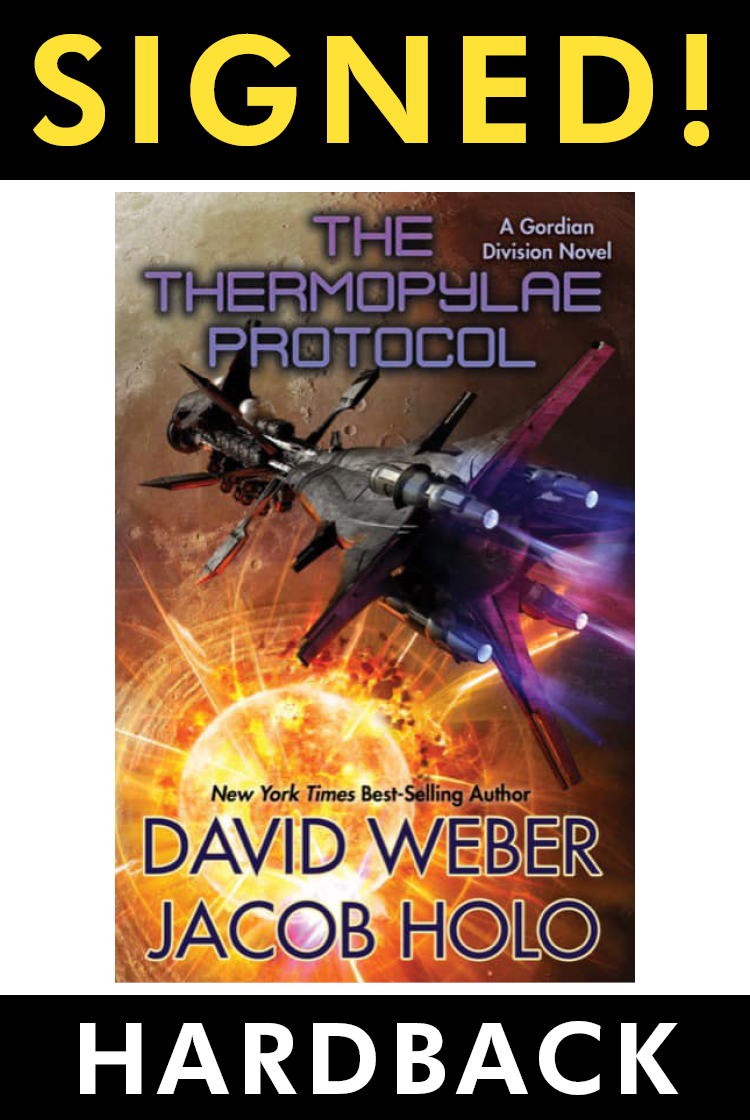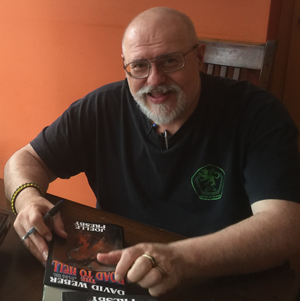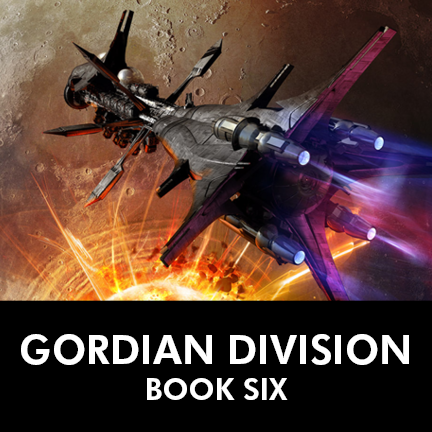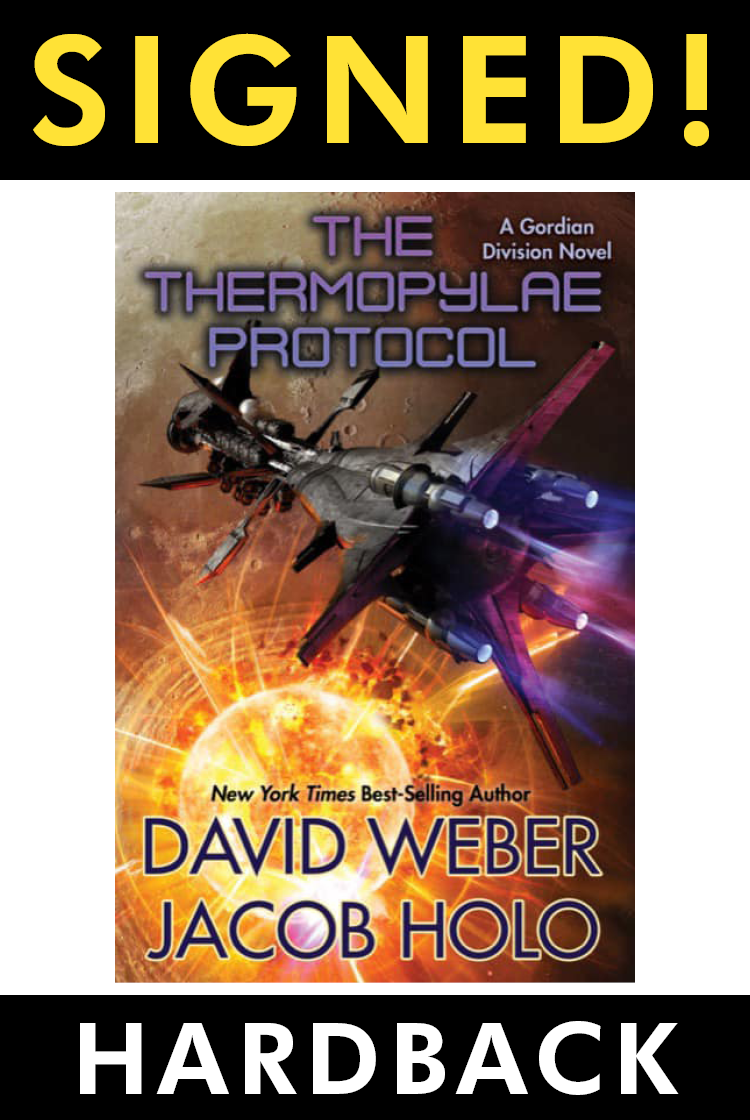
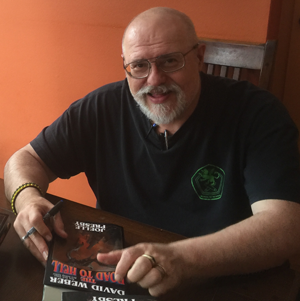
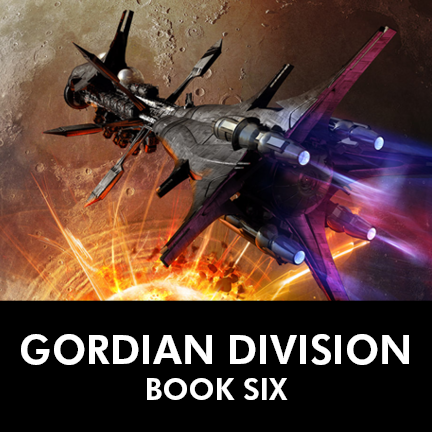

Book Six in the Gordian Division series. Published by Baen Books.
About this premium SIGNED HARDBACK:
Signed by both David Weber and Jacob Holo. Contact us at holowriting (at) holowriting.com for personalization requests.
Prefer a different format? Click here.
A Time Storm is Brewing.
After an industrial ship carrying advanced self-replicating machines explodes on its way to Mercury, analysis of the wreckage reveals it to be forty years too old. Raibert Kaminski, the Gordian Division’s top agent, and his crew on the TransTemporal Vehicle Kleio soon discover the ship had been transported to an uncharted universe, one with temporarily accelerated time. Forty years passed for the ship’s industrial machines while everyone else experienced only a few short days. Raibert is certain a powerful weapon of some nature has been built out in the unexplored reaches of the multiverse, but where and by whom remains unknown.
The search is on, and the Gordian Division musters its fleet of time machines at Providence, a massive transdimensional station under construction. They call upon their allies from the militaristic Admin for aid in their search—but before plans can be formalized, the leader of the Admin’s Department of Temporal Investigation is murdered while visiting Providence, and the joint operation is thrown into chaos.
Accusations fly and tensions mount between the two organizations. Detectives Isaac Cho and Susan Cantrell—both fast becoming experts in transdimensional crime—are dispatched to Providence. But the clock is ticking for the detectives and Raibert’s crew. A vast, powerful conspiracy has shuddered into motion, and the two teams may be all that stand between it and destruction on a universal scale.
“. . .moments of humor amid the expected culture clashes, and the exploration of the authors’ well-realized far-future world. . .It’s pure entertainment.” —Publishers Weekly on The Janus File
This product is a premium hardback novel.
Prefer a different format? Click here.

Enjoy a sample from THE THERMOPYLAE PROTOCOL
PROLOGUE
SourceCode Industrial Carrier Grand Sculptor
SysGov, 2981 CE
“Look at it this way. It could be worse.”
Antoni Ruckman, lead engineer of the Dyson Realization Project, turned with the slow, deliberate motion of a man who refused to believe the nonsense assaulting his ears to face his brother.
“Excuse me?” he replied.
“It could be worse,” Bradley Ruckman repeated. And then, as if realizing his statement hadn’t been well received, flashed a defensive, almost apologetic smile.
“How, exactly?” Antoni asked.
“Well, we could have been on board when the ship blew up.”
Antoni let out a noncommittal harrumph, then turned back to face the source of his ire.
A false color image of Reality Flux hovered above the bridge’s command table. Or rather, a projection of the ship’s expanding debris cloud. A trio of labeled icons swam about the periphery: two Consolidated System Police corvettes and the Grand Sculptor, which SourceCode’s upper management had detached from their construction fleet to assist SysPol.
Reality Flux had been one of SourceCode’s older autonomous constructors. Perhaps not as well maintained as the rest of the construction fleet—its departure from SourceCode HQ’s Saturnian orbit had been delayed due to a reactor imbalance—but to have exploded on the way to Mercury? Accidents happened, but what were the odds the reactor would fail so spectacularly after receiving additional maintenance?
Not very high.
Antoni shook his head, his eyes locked forward, jawline tense, almost to the point of forming a snarl.
“Hey.” Bradley placed a hand on his shoulder. “It’ll be fine.”
“This screws up our whole timetable. We’re going to lose months because of this fiasco. Months!”
“Of course we will. But look at the bright side. All we lost is equipment. No one died when Reality Flux blew; it was catching up to the fleet on full auto. And besides, no one’s going to blame you for this.”
“That’s not why I’m upset,” Antoni growled under his breath, fingertips resting on the command table.
“Then why?”
“It’s…” Antoni paused and regarded his brother once more.
The two men looked identical, with dark skin and trim heads of black hair that extended down into generous, curling sideburns. They even wore matching black business suits, though the more complex green tracery on Antoni’s served as a subtle nod to his position as lead engineer. Either man could have changed his appearance at any time to create greater visual separation; they were both abstract citizens, after all. Their appearances were purely virtual, even if the avatars were modeled on Antoni’s original organic body before he’d transitioned to a virtual existence.
The round bridge they stood in was equally abstract, the environment running within Grand Sculptor’s infostructure. SourceCode employed very few organic citizens, and Grand Sculptor lacked a physical bridge entirely.
Bradley waited beside him, a patient question in his eyes.
“It’s…” Antoni turned away once more and gritted his teeth together. “I thought we were past this sort of crap!”
“You think it’s sabotage?”
“What else could it be? Take your pick who it might be this time! Maybe the nuts over at the Mercury Historical Preservation Society! Or perhaps our competitors over at Atlas again, trying one last time to undermine us! Never mind what happened to you—”
He paused, his open hand pointed toward Bradley. He lowered it and frowned.
“Sorry,” he apologized softly. “I didn’t mean to dig up bad memories.”
“It’s all right.” Bradley paused, then shrugged. “I’ve been doing a lot better recently.”
“I know you have, and I’m proud of you for that. I know it hasn’t been easy.”
Bradley smiled and glanced away bashfully.
Bradley Ruckman had started his existence as an illegal copy of Antoni’s connectome—the neural map of his mind—which criminals had then modified to make him more docile and easier to extract information from. The damage had been extensive—almost irreversible—by the time SysPol rescued him from the copy-kidnappers. Doctors at Saturn’s Connectome Wellness Center had worked a small miracle piecing his mutilated mind back together, but the aftershocks of the trauma lingered on, even five months after the incident. Both men still transmitted over to the CWC for weekly therapy sessions.
“It’s just…I’ve had it with people messing with our lives!” Antoni brought a horizontal hand up to his throat. “I’ve had it up to here!”
“It might still be an accident.”
“Not likely!”
“Let’s not jump to conclusions. If anything survived intact, it should be the black box.”
Antoni let out a long, calming exhale, then nodded in agreement.
Even though he was an abstract being, his connectome didn’t exist in isolation. A biochemical simulation ran in parallel with his neural map, which allowed certain acts—such as releasing a deep breath—to affect his mood.
“I suppose you’re right.”
Antoni pulled up a schematic of the pre-explosion Reality Flux.
The design resembled a line of five fat spheres joined together by thick bracketing. The ship’s hot singularity reactor had been housed in Sphere Five while the black box and control systems had been part of Sphere One. Not only was the black box designed to survive most of the violent ends that could befall spacecraft, it was also located at the farthest point from the explosion’s source.
Antoni switched the image back to the debris cloud.
Judging by the chunks SysPol’s already tracked down, he thought, a good portion of the ship survived the explosion. Just…not in one piece.
“Chief Engineer Ruckman,” said the ship’s nonsentient attendant program, “Executive Xian would like to speak with you.”
“Of course he would,” Antoni grumbled. “Should I transfer over to his ship?”
“No, Chief Engineer. Executive Xian plans to transmit from Radical Architect to this ship a few minutes from now. I am sorry, but he was not more specific about his departure time.”
“Fine, fine. I’ll wait here.”
Six minutes later, a man in a black-and-green suit appeared on the far side of the command table. His pale skin resembled wax paper, and the soft glow in his white eyes wavered, giving the impression of candle flames flickering within his head.
“How bad is it?” Junior Executive Xian asked, clasping origami hands behind his back.
“If you’re looking for reassurances, look elsewhere,” Antoni said. “All I can give you is honesty with a light garnish of shattered dreams.”
“I would expect nothing less,” Xian replied neutrally, then glanced over the false-color debris field. “That looks bad.”
“Because it is. The ship exploded.”
“Hmm.” Xian took in the display. “So it would seem. Casualties?”
“None, thankfully. The ship was on auto.”
“At least there’s that.” Xian sighed, and his shoulders lost some of their rigidity. “Do we know what destroyed it?”
“Initial assessment from SysPol is a catastrophic failure in the hot singularity reactor.”
“And your thoughts on their theory?”
“Barring an external device, I don’t see how it couldn’t be the reactor. We’re hoping they’ll recover the black box. Once we have our hands on the flight data, we should know more. SysPol’s already requested our assistance in the investigation. We’ll have access to the raw data roughly in sync with their forensics teams, and we’ll have the opportunity to provide input before they file any reports.”
Xian didn’t so much as bat an eye at the mention of an “external device.” Not with the long history of criminals and malcontents working to undermine the Dyson Realization Project and SourceCode’s involvement in it.
“Anything unusual leading up to the incident?” the executive asked.
“Just one minor inconsistency,” Antoni said. “Bradley noticed a gap in the Flux’s reporting. In automatic, the ship sends an hourly log to its command vessel, which is Grand Sculptor. Most of the logs look perfectly normal, but one from about a day ago was received late.”
“And we didn’t notice?”
“Grand Sculptor’s attendant did, but it was flagged as a low-priority warning, and a resend request was transmitted automatically to Reality Flux. The ships were about twenty-four light-minutes apart at the time, and the second log was received with the expected transmission delay, so the alarm was cleared automatically and never brought to our attention. The attendant would have notified us if there’d been a prolonged communication blackout.”
“I see,” Xian said. “Why wasn’t Reality Flux with the rest of the fleet?”
“It left HQ late due to a reactor issue.”
“Enough of an issue to cause this?” Xian indicated the display.
“I don’t see how, but I suppose it’s possible. After the reactor was rebalanced, the ship was placed on a full-thrust course for Mercury to make up for lost time.”
Xian raised a paper eyebrow. “We maxed out the ship with the dodgy reactor?”
“Don’t look at me,” Antoni defended stiffly. “Maintenance certified the craft ready for deployment with no restrictions. If you have a problem with me trying to keep to our original schedule, take it up with them.”
“Just asking the questions the other execs will ask me,” Xian replied, his tone lacking any edge of confrontation. “What sort of impact are we looking at?”
“This is going to shift the whole blasted schedule.”
“By how much?”
“The Flux’s reservoirs were carrying half our self-replicator seed volume for this job. Without those microbots, we either need to manufacture replacements back at HQ and haul them over here or use the ones we do have to replicate additional swarms. Both options will be time intensive. You’re looking at two months minimum. Maybe three.”
“Is any of the lost volume recoverable?”
“I don’t see how. What wasn’t vaporized is scattered all over the place.”
“Hmm.” Xian pursed his lips. “Anything else to add?”
“Not until SysPol finds our black box.”
“All right. Keep me informed of any developments. In the meantime”—Xian’s frown creased his paper face—“I now need to make my own report to the rest of the board.”
“Good luck with that.”
Xian grunted and vanished.
***
It took SysPol a little over five hours to track down the piece of wreckage containing the black box and another twenty minutes to pull the log files and transmit them to Grand Sculptor. Antoni and Bradley spent the next few hours poring over the logs.
“You thinking what I’m thinking?” Antoni asked his brother after a long period of silence. The two men stood on either side of the bridge command table, reports and diagrams cluttering the space between them.
“Well, we do come from the same mental stock.” Bradley shrugged. “So, probably?”
“Fair enough.” Antoni permitted himself a humorless smile. “If you ask me, this whole mess paints a rather unflattering picture of our maintenance department. Sure, they addressed the imbalance that took the ship off-line, but they missed a subtler secondary problem, and it looks like their repairs made that one worse. Then, to compound matters, we pushed the reactor hard for a few days so the ship could catch up, and then”—he spread his hands grandly—“boom.”
“I agree with you to a point.” Bradley held up a finger. “But the problem I have with that scenario is the reactor’s own diagnostics should have caught this problem before it became critical. Instead, the logs show normal operations up until a few seconds before the shell blew open.”
“Overly normal, if you ask me. All those sensors had to be yanked out when they worked on the reactor. Some of them could have been reinstalled incorrectly, causing us to miss the impending disaster.”
“Maybe, but that seems like a lot of shoddy maintenance work.”
“What are you suggesting, then? That someone deliberately botched the repairs?”
“I…” Bradley hesitated, then frowned. “I don’t know what I’m saying yet, other than I’m not ready to buy the maintenance angle.” He lowered his head and added a new tab to one of his reports.
And with that, Antoni knew the conversation was over. Bradley had a habit of ending conversations unilaterally when he had nothing more to say, and Antoni had found it best to leave him be when that happened.
Antoni returned to his own report. He understood his brother’s hesitancy, but the more he dug through the data, the more corroboration he found that their own maintenance team had screwed up.
“Chief Engineer Ruckman,” said Grand Sculptor’s attendant, “I have a message from Executive Xian. He is requesting an update on your review of the black box data.”
“I figured we were due for a little managerial nagging,” Antoni grumbled.
“Is that the response you would like me to send him?”
“Hell, no! Tell him he can join us at his convenience.”
“Yes, Chief Engineer.”
Xian appeared on the bridge less than a minute later.
“Well? What do we have?”
“Nothing conclusive,” Antoni said, “but the evidence is building that HQ messed up the repair, leading to the reactor blowing.”
“I see.” Xian’s candlelit eyes flicked across the reports, then back to the twin Ruckmans. “Was the reactor one of ours?”
“No. Flux used a custom model designed and built by the Mitchell Group.”
“Why not one of ours? Don’t we make products in that power and performance range?”
“We do nowadays, but Reality Flux was one of our oldest ships. We weren’t as deep into the hot singularity market back then, so we subcontracted the reactors and several other systems.”
“I hadn’t realized that.” Xian looked down and rubbed his chin thoughtfully. “I wonder if we can use that to deflect some of the blame.”
“I’d be careful before venturing down that road. If you ask me, the ship exploded because our own team messed up.”
“And why did it explode?”
“The reactor was out of balance, and the imbalance grew worse until the outer shell cracked.”
“Which means?”
“Just what I said.” Antoni put a hand on his hip. “How familiar are you with hot singularity reactors?”
“Not terribly. Self-replicators are more my area of expertise.”
“Then would you like a refresher?”
Xian raised his lidded, somewhat suspicious eyes.
“All right, but don’t go overboard,” the executive warned. “I know how you engineers can be.”
“I promise I’ll be gentle.” Antoni flashed a disarming smile. “First, understand that ‘hot singularity’ is a bit of a misnomer. It’s shorthand for what is essentially a fake black hole encased within a shell of exotic matter. The matter inside the core emits Hawking radiation, which is collected by the shell and used to power other systems. Black holes evaporate at a rate inversely proportional to their mass, and these reactors deal with such low mass values—fourteen hundred tons for the Flux—that the energy released by a real black hole of that size would be catastrophically rapid!”
“You’re enjoying this, aren’t you?”
“Maybe a little. Anyway, the positive mass inside the reactor’s core and the negative mass in the shell are segregated from basically nothing during construction. It’s a little more complicated than that, but the important point is they form two halves of a balanced nothingness. Also, that’s what they’re supposed to return to during a critical failure. The positive and negative mass-energy components of the system collapse and cancel each other out.”
“Which didn’t happen this time,” Xian said dryly.
“Because the two halves were severely out of balance. Normally, an imbalance isn’t a major concern. As a general rule, hot singularity reactors are stable and resilient, but if a problem like this is allowed to grow, the disparity in the system will eventually reach a critical threshold. To the point where the system collapses in on itself. When that happens, most of the mass-energy cancels out, but any surplus is released.”
“Boom?”
“Boom. That’s why the reactor was being worked on back at HQ.”
“Which should have prevented the boom, not caused it.”
“It seems the repairs were executed poorly.”
“Could the failure have been caused by an outside party?” Xian asked, perhaps a little too hopefully.
“We can’t rule anything out this early, but I haven’t seen any signs of—”
“Aha!” Bradley exclaimed. He looked up with a wide grin, and the other two men faced him.
“Ahh-hah?” Xian cocked an eyebrow.
“Found something?” Antoni asked, leaving off the please-don’t-embarrass-us-in-front-of-the-boss part. Whatever his brother had found, Antoni would have preferred he and Bradley review it together first before discussing it in front of Xian. Giving half-baked information to a manager was ill-advised at the best of times, and that went double now that Xian was on the hunt for a scapegoat.
“It’s fake,” Bradley declared boldly.
“What’s fake?” Xian asked.
“All of it. The whole thing!”
“I’m sorry,” Antoni said. “You lost me.”
“The black box data!” Bradley smiled, almost gleefully. “Someone tampered with it!”
“What?” Antoni hurried over to his brother’s side. “How can you tell?”
“Here.” Bradley pointed to one of his charts. “See for yourself.”
Antoni joined his brother, and Xian came up behind them, peering at the data between their shoulders.
“What am I looking at?” Xian asked.
“Some of the black box metadata,” Antoni said. “Time stamps, file sizes, access logs. That sort of thing.”
“Now take a look at this!” Bradley jabbed a line near the bottom.
“That’s…a date,” Xian observed blandly.
“Exactly!”
“I don’t see the significance. What’s got you so excited?”
“Wait a second.” Antoni leaned closer. “Did that date come from the box’s atomic clock?”
“You’ve got it!” Bradley beamed at him.
“But then…how can that be?”
“Care to explain?” Xian asked.
“Bradley spotted a discrepancy in the time stamps.” Antoni scrolled through metadata. Sure enough, all the other dates looked normal.
But then, Antoni thought, all of those are generated by software, and software is malleable by definition. A skilled individual with the time and access could have hacked these records. But the date from the atomic clock comes from hardware. A hacker couldn’t touch that without physical access to the black box, and even then, it’s an easy feature to miss.
“What sort of discrepancy?” Xian asked.
“Well, according to this,” Antoni began, then paused to lick his lips, “the ship was forty years older than it should have been when it exploded.”

